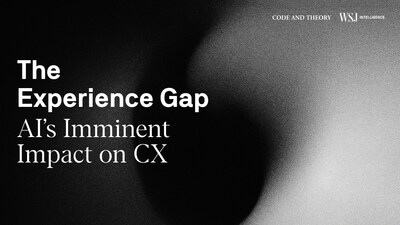93% of Executives Admit Their Customer Experience Is 'Broken'
93% of Executives Admit Their Customer Experience Is 'Broken' |
| [02-October-2025] |
New WSJ Intelligence and Code and Theory research report shows that businesses are failing to harness AI's potential to fundamentally reshape customer relationships. NEW YORK, Oct. 2, 2025 /PRNewswire/ -- Business leaders chasing AI-driven efficiency often overlook how AI can impact the people who matter most: their customers, according to new research conducted by WSJ Intelligence and Code and Theory, a Stagwell (NASDAQ: STGW) agency. The report, titled "The Experience Gap: AI's Imminent Impact on CX," found that only 28% of the 800 C-suite members surveyed say they are leveraging new technologies to create digital customer experiences (CX) that are "innovative or adaptive." In fact, the vast majority of respondents (93%) characterized their CX as "broken," even though 94% of the respondents agree that CX strategy contributes directly to their business's success. Companies mastering digital CX are redefining entire industries. They generate 30% more revenue — $1.4 billion on average — than customer-experience laggards. The study found that success demands rethinking customer relationships from the ground up. AI offers the path to emotionally intelligent customer connections that drive lasting competitive advantage. Among the most notable takeaways:
The primary barriers to CX transformation are cultural and organizational rather than technological. While 53% of respondents say they're "very ready" for transformation, the gap between intention and capability reveals deep structural issues. When executives identify transformation obstacles, they point to internal failures rather than external constraints: leadership misalignment (49%), creative talent shortages (44%) and organizational silos (43%). Even among industry leaders, 56% cite cultural dysfunction as a primary barrier. Don McGuire, Senior Vice President and Chief Marketing Officer, Qualcomm Incorporated, says: "When you're integrating AI tools into your workflows, you have to take a human-centric approach and plan for that as the outcome. Think about your customer interactions. Can they be improved? Can an interaction with an AI be better than one with a human? That's not easy and it takes a lot of planning. The companies taking leadership roles will be the ones that vault ahead." Dan Gardner, Co-Founder of Code and Theory, says: "The companies winning with AI aren't following best practices; they're inventing new categories of customer value by connecting data, services and experiences in ways that seemed impossible two years ago. Find the spaces where your customers are underserved, frustrated or forced to cobble together solutions from multiple providers. Then use AI to own that entire experience. The question isn't what AI can do; it's what only your brand can do with AI that no one else can replicate." The survey demographics comprised 800 U.S.-based senior executives at companies with at least $500M in annual revenue, with an even split between CEO (33%), CTO/CIO (33%) and CMO (33%). Learn why the winners are winning, how you can leverage AI to deepen emotional connections with customers and what the roadmap for success looks like. Download "The Experience Gap: AI's Imminent Impact on CX" report here. About Code and Theory About WSJ Intelligence Media Contact
SOURCE Stagwell Inc. | ||
Company Codes: NASDAQ-NMS:STGW,NASDAQ:STGW |




















